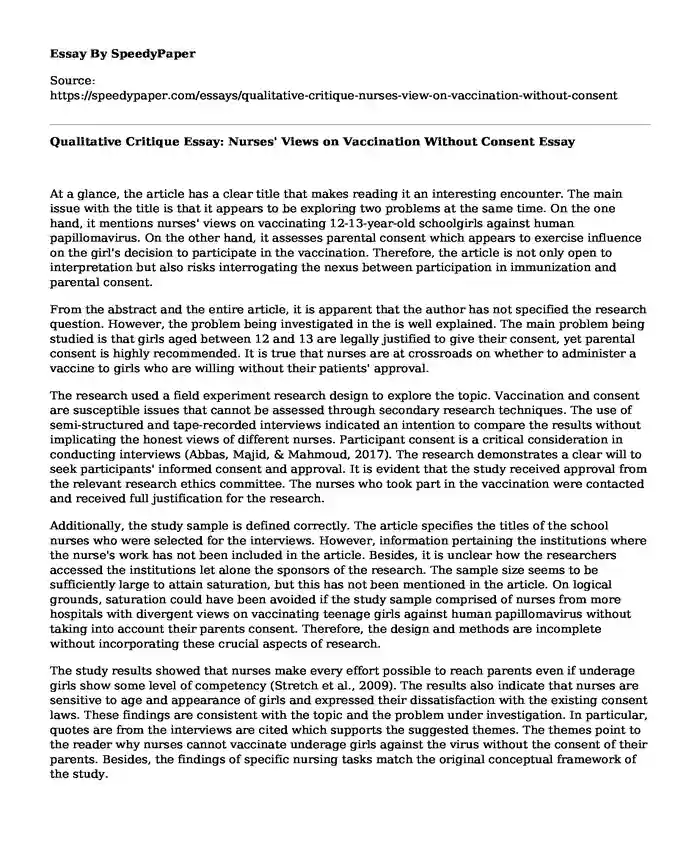At a glance, the article has a clear title that makes reading it an interesting encounter. The main issue with the title is that it appears to be exploring two problems at the same time. On the one hand, it mentions nurses' views on vaccinating 12-13-year-old schoolgirls against human papillomavirus. On the other hand, it assesses parental consent which appears to exercise influence on the girl's decision to participate in the vaccination. Therefore, the article is not only open to interpretation but also risks interrogating the nexus between participation in immunization and parental consent.
From the abstract and the entire article, it is apparent that the author has not specified the research question. However, the problem being investigated in the is well explained. The main problem being studied is that girls aged between 12 and 13 are legally justified to give their consent, yet parental consent is highly recommended. It is true that nurses are at crossroads on whether to administer a vaccine to girls who are willing without their patients' approval.
The research used a field experiment research design to explore the topic. Vaccination and consent are susceptible issues that cannot be assessed through secondary research techniques. The use of semi-structured and tape-recorded interviews indicated an intention to compare the results without implicating the honest views of different nurses. Participant consent is a critical consideration in conducting interviews (Abbas, Majid, & Mahmoud, 2017). The research demonstrates a clear will to seek participants' informed consent and approval. It is evident that the study received approval from the relevant research ethics committee. The nurses who took part in the vaccination were contacted and received full justification for the research.
Additionally, the study sample is defined correctly. The article specifies the titles of the school nurses who were selected for the interviews. However, information pertaining the institutions where the nurse's work has not been included in the article. Besides, it is unclear how the researchers accessed the institutions let alone the sponsors of the research. The sample size seems to be sufficiently large to attain saturation, but this has not been mentioned in the article. On logical grounds, saturation could have been avoided if the study sample comprised of nurses from more hospitals with divergent views on vaccinating teenage girls against human papillomavirus without taking into account their parents consent. Therefore, the design and methods are incomplete without incorporating these crucial aspects of research.
The study results showed that nurses make every effort possible to reach parents even if underage girls show some level of competency (Stretch et al., 2009). The results also indicate that nurses are sensitive to age and appearance of girls and expressed their dissatisfaction with the existing consent laws. These findings are consistent with the topic and the problem under investigation. In particular, quotes are from the interviews are cited which supports the suggested themes. The themes point to the reader why nurses cannot vaccinate underage girls against the virus without the consent of their parents. Besides, the findings of specific nursing tasks match the original conceptual framework of the study.
The conclusion has been stated with clarity. The conclusion pegs the responsibility of caring for girls whose parents have not given consent for vaccinating against the illness. This conclusion is controversially contradicting the finding that nurses are reluctant to provide care unless they communicate to parents. As an improvement to the study, there is a need to incorporate research question and if possible hypothesis. What is more, future research should consider sample diversity and presentation of results and findings using figures and tables.
References
Abbas, H., Majid, V. S., & Mahmoud, B. (2017). Critical Appraisal of Published Qualitative Research Papers in the Field of Nursing Management by Iranian authors&58; A Cross-sectional Study. Acta Facultatis Medicae Naissensis, 34(2), 119-128.
Stretch, R., McCann, R., Roberts, S. A., Elton, P., Baxter, D., & Brabin, L. (2009). A qualitative study to assess school nurses' views on vaccinating 12-13-year-old schoolgirls against human papillomavirus without parental consent. BMC Public Health, 9(1), 254.
Cite this page
Qualitative Critique Essay: Nurses' Views on Vaccination Without Consent. (2022, Mar 09). Retrieved from https://speedypaper.com/essays/qualitative-critique-nurses-view-on-vaccination-without-consent
Request Removal
If you are the original author of this essay and no longer wish to have it published on the SpeedyPaper website, please click below to request its removal:
- Essay Example on Rapid Developments in Automation and Robotics
- Lois Mailou Jone Research - Art Essay Example
- Finance Essay Sample: Introduction to Financial Analysis
- Essay Sample Dedicated to Human Cause of Global Warming
- Essay Example about Overcrowding in Prisons
- Free Essay on Human Resource Management Strategies in Recruitment for Southwood School
- Free Essay about Inflammatory Bowel Diseases
Popular categories





